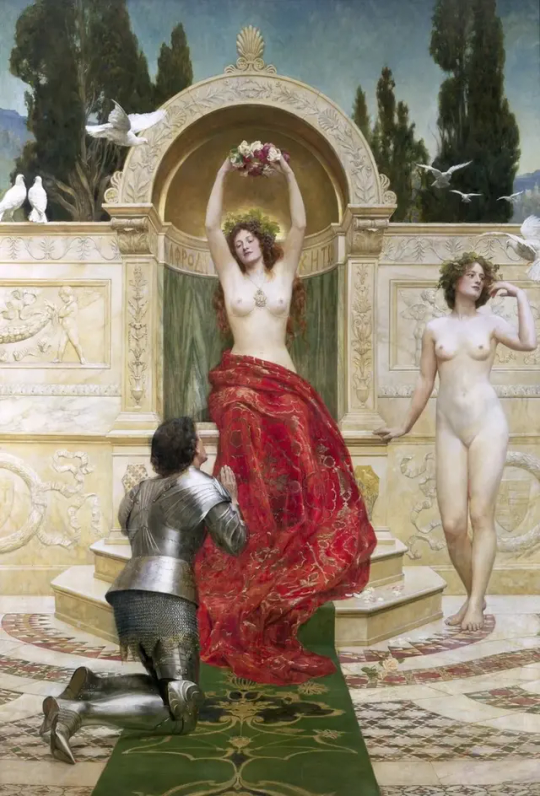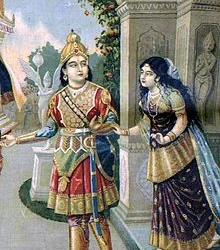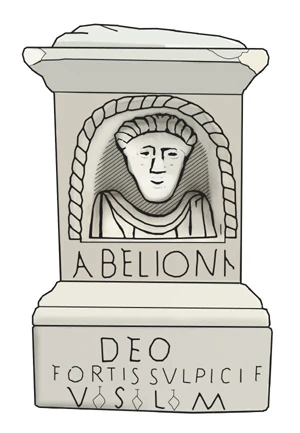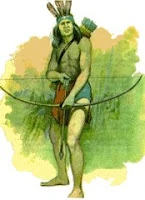- Maria - They/Them - 21 -A blog dedicated to talking about diffrent things in mythology with the goal of being accessiable since I noticed that some pagan spaces weren't very accessiable to others!- Main: @thecrystalbladesystem -
Don't wanna be here? Send us removal request.
Text
*Pria

*Pria was a possible Proto-Indo-European goddess associated with beauty, love, sex, and possibly war; she played a role akin to that of Aphrodite, Venus, and Freyja.
*Pria's parents are unknown in the PIE cosmogony, but based on her descendants, Dyēus or Wérunos could be her father.
It is possible that *Pria would be a daughter of Dyđus since in Homer's Teogony, Aphrodite was born from the union of a god (Zeus) and a goddess (Dione).
However, according to the Hesiod cosmogony, Aphrodite was the daughter of Uranus's blood. Ahura Mazda, who the Greeks identified with Aphrodite. created the Zoroastrian goddess Anahita, an ahura. Interestingly, both Ahura Mazda and Uranus have their roots in the proto-Indo-European nigth god Wérunos. In this instance, a potential variant of the proto-Indo-European myth might also regard *Pria as Wérunos' daughter.
*Pria most likely had Martus, the Indo-European God of War, and Dyēus as consorts, using the Greek Aphrodite and the Roman Venus.
However, according to zoroastrianism, Anahita is Mithra's consort; therefore, it's possible that *Pria had a solar deity as her consort.
*Pria's Greek and Roman ancestry suggests that she might be the mother of an hypothetical, unreconstructible love god who predates both Eros and Cupid. Her masculine Norse ancestry further supports this theory. A potential ancestor of Fjolnir, a demigod, may have been mothered by Freyr *PriHyéh₂.
Aphrodite was depicted in Sparta with classical Spartan weapons, and Freyja, the Norse war goddess, is connected to *Pria as well as both Athena and Minerva. It's interesting that many of *Pria's descents were associated with semetic goddesses like Astarte and Ishtar, so it's possible that *Pria's figure originated from a proto-afroasiatic goddess of sex and war, or the Sumerian Inanna.
Both the English and its Spanish counterpart Viernes originate from *Pria. Friday is derived from Frigga's Day, which honors the Norse/Germanic goddess sometimes confused with Freyja,*Pria's female descendant, while Viernes is derived from dies Veneris, or Venus Day.
Similar to other proto-Indo-European gods she has also left some of her legacy within Christianity as well, where the Virgin Mary is depicted in art using traits from both Venus and Aphrodite.
Etymologically, the Slavic Saint Paraskeva Friday, who is revered in folk orthodoxy, originated from *Pria.
#Ahura Mazda#Greeks#Greek Aprodite#role akin#PIE cosmogony#proto-Indo-European#Hesiod#Indo-European#Anahita#Roman#Norse#Spartan#English#Spanish#Vierenes#Christianity#Slavic#Paraskeva Friday#war#possible#PIE#goddess#Aphrodite#Venus#god#Wérunos#daughter#according#depicted#well
14 notes
·
View notes
Text
Sorry for the long unintended break you guys, I just moved out fully this week and my internet is shit since I'm in the middle of nowhere in Romania lol. Might be moving back to Canada in this coming July so here's hoping my plans with that don't fall through lol
0 notes
Text
According to one telling of the tale, Abhimanyu is a son of Chandra reincarnated. Brahma agreed that the reincarnated spirit would only live for sixteen years because the Moon god did not want to be separated from his son for an extended period of time.
Abhimanyu

Arjuna and Subhadra were the parents of Abhimanyu. He belonged to the Kuru dynasty. He was Hastinapur's heir until his death at the age of sixteen on the thirteenth day of the Kurukshetra War. Parikshit, his son born after his death, succeeded him as heir and ultimately as king.
#Kurukshetra War#Abhimanyu#Moon god#kuru dynasty#Arjuna#Subhadra#Kuru#Parikshit#Chandra#Brahma#son#sixteen#reincarnated#heir#death#years#War#ultimately
1 note
·
View note
Text
hey ya'll so a little update my grandfather had a stroke the day before yesterday so yeah my stress has tripled lmao
0 notes
Text
Hey everyone sorry I haven't been active stress is taking me the fuck out right now with trying to find a place to live before me and my mom get kicked out lol I just want to give everyone a heads up if I seem off right now it's cuz my mental state is really not great so if I snap at anyone on here I apologize in advance, I really don't mean it I'm just not in great spot in life right now and my temper is a little bit off right now,, just a brief warning and something to keep in mind rn and I promise to be back with some posts in the next few days hopefully
0 notes
Text
Hello hello, I do not how active I'm going to end up being beyond the end of the month because my housing situation is not great guys! I am potentially being kicked out at the end of the month so my mental health is really starting to struggle guys so my motivation is a little bit crushed cuz of the stress,,, so sorry guys!! I'll keep you all posted
0 notes
Text
Abhimanyu

Arjuna and Subhadra were the parents of Abhimanyu. He belonged to the Kuru dynasty. He was Hastinapur's heir until his death at the age of sixteen on the thirteenth day of the Kurukshetra War. Parikshit, his son born after his death, succeeded him as heir and ultimately as king.
#Kurukshetra War#Subhadra#Parikshit#thirteenth day#Kuru dynasty#Arjuna#Abimanyu#Kuru#heir#death#War#ultimately#thirteenth#succeeded#son#sixteen#druidicentropy
1 note
·
View note
Text
Honestly ya'll I really dislike the Encyclopedia of Fairies by Bane Theresa, she essentially just went through world mythology and just slapped the fae label onto anything that has any sort of connection with nature and it's so INFRIATING how it directly calls something as being apart of the fae but then within the fucking books own energy itself it directly contradicts itself by mentioning they're a completely different nonhuman species entirely, IT REALLY JUST ANNOYS THE FUCK OUT OF ME😭 I've been thinking about kind of creating my own like speculative classification system for mythological beings purely out of spite for this one book tbh
I personally think she's one of the writers that have influenced this idea that some people have about the "fae existing on every single continent" belief that I've seen some Celtic pagans regurgitate and it honestly doesn't really sit right with me since yeah if you're just casting the net as wide as fucking possible and including every single nonhuman being that's even remotely connected with nature then of course you're gonna come to that conclusion 💀
I've been getting into like speculative biology so this has been on my mind for the last couple of days and just how absolutely disorganized all of the actual classifications for mythological & fictional monsters/beings actually is so I might end up just cobbling together my own methods cuz my autism hates how vague it all ends up being and also how it can sometimes be used negatively against other cultures and is kind of a colonization tactic that's been used for a really long time most notably by the Romans and later on by the colonial powers so even though there's no actual intention to do harm it's somewhat rooted in not great methods if that makes sense?
Kind of just wanted to spew my thoughts on this topic a little bit since it's made me realize how unhelpful the overall classification system for what is/isn't fae is just nonexistent so I wanted to prompt everyone with the following question: what traits do ya'll think something has to have either in their behaviors, traits, use of magic, and appearances for it to actually be classified as being apart of the fae?
#druidicentropy's rambles#classification system#Bane Theresa#great methods#book tbh#actual intention#nonhuman species#Encyclopedia of Fairies#Romans mentioned#INFRIATING#book#mythology#folklore#european folklore#fae#system#nature#nature deities#celtic paganism#paganism#british folklore#celtic folklore
3 notes
·
View notes
Text
Abhean
In Irish mythology, Abhen is both an artist and a poet. A poem by Fland Meinstrich in Lebor Gabala Eren claims that Óengus killed him in front of Meder.
The name could have originated from the Proto-Celtic b * Ad-bej-ānos, literally meaning "striking man," or it could have also referenced the idea of scraping a harp.
#druidicentropy#Fland Meinstrich#Óengus#irish mythology#striking man#Irish#Abhen#Lebor Gabala Eren#Meder#Proto-Celtic b * Ad-bej-ānos#striking#scraping#referenced#poet#poem#originated#name#mythology#Meinstrich
1 note
·
View note
Text
Abezethibou
A one-winged demon named Abezethibou inhabits the Red Sea, schemes against all the winds beneath the sky, and opposes Moses.
Excerpts from The Encyclopedia of Demons and Demonology:
Abezethibou claims in the Ament of Solomon that he was once seated in the first heaven, known as Amelouth. He was there when Moses was brought before the Egyptian pharaoh and was called upon to support the Egyptian magicians in their attempt to discredit Moses. Abezethibou claims credit for inciting the Egyptians to pursue the Israelites during their exodus and for turning the pharaoh against Egypt. Abezethibou is trapped with the pillar of air when the Red Sea splits and falls in on the Egyptians. The demon Ephippas then comes to take him to King Solomon. Solomon gives Ephippas and Abezethibou the command to hold the pillar aloft until the end of time after tying them to it—possibly a reference to the Milky Way.
#druidicentropy#Egyptian#Red Sea#Abezethibou#Moses#discredit Moses#Egyptian pharaoh#demon Ephippas#Encyclopedia of Demons and Demonology:#Ament of Solomon#Israelites#Egypt#Milky Way#Solomon#Sea#Red#pillar#pharaoh#Ephippas
1 note
·
View note
Text
Abellio

Abelio was the god of apple trees in one branch of the ancient Celts, and he was particularly honored in the Garonne Valley in southwest France.
The name of this god is not entirely clear, but it might have come from the Proto-Celts, from the word Ad-belj-ō, which means literally "green-growing," or at least "greenish."
Though it makes sense in relation to this god's role, this should only be accepted conditionally because there is disagreement over the origin of his name and no trustworthy source is known.
Abelio shares some characteristics with gods from other pantheons, like Apollo and Osiris.
#Garonne Valley#gods#apple trees#southwest France#ancient Celts#Celts#France#name#Abelio#word#Valley#trustworthy#trees#southwest#source
0 notes
Text
Abderus
In Greek mythology, Abderus (meaning "the son of battle") was the son of Hermes and Opus. He was Heracles's male lover.
After learning that Abderus had been eaten by the man-eating mares belonging to the Bistonian king Diomedes, Hercales constructed the city of Abdera in honor of his beloved.
0 notes
Text
Abcán
According to Irish mythology, the Tuatha Dé Danann, the ancient Celtic deities of Ireland, included the dwarf poet and musician Abcán (spelled Abhcán nowadays). It was rumoured that he owned a bronze boat near the Assaroe Falls with a tin sail.
The dwarf Abcán is the one who transports the goddess Ruad from the Otherworld to this one in the Ruad death story, so that she can entice the human Aed Srónmár. She jumps into the water, drowns, and hears mermaids singing—or, in other versions, music from a fairy mound.
In another tale, Cúchulainn the hero, captures Abcán. He sets himself free by lulling the warrior to sleep with such an irresistible melody.
The dwarf musician Fer Í and Abcán are very similar, and Abcán may even go by a different name.
The Encyclopedia of Celtic Mythology and Folklore says he's either a god or not.
#druidicentropy#Assaroe Falls#Abcán#Ruad#Celtic#dwarf poet#dwarf Abcán#Irish mythology#Irish#Ireland#Abhcán#Aed Srónmár#Cúchulainn#Fer Í#Encyclopedia of Celtic Mythology and Folklore#Í#dwarf#mythology#musician#who#water#warrior#versions
11 notes
·
View notes
Text
Abaçaí

Indigenous peoples are invited to dance, sing, and celebrate by the spirit known as Abaçaí, who lives in the forests.
The Abaçaí, according to Tupi mythology, lives in the wilds of the forests and possesses indigenous people who detach themselves from their group, sending them into a rapturous trance where they lose consciousness.
A spirit that the evangelization and European perspective attempted to eradicate, ignoring the global culture's innate need for escape, in an attempt to turn him into a "evil genius".
This spirit was one of the most dangerous evil spirits because it could transform into any animal, person, or object. Abaçaí claimed the souls of indigenous women who were virgins.
#druidicentropy#Abaçaí#Tupi mythology#Indigenous peoples#Tupi#European#spirit#forests#who#indigenous#lives#evil#women#wilds
4 notes
·
View notes
Text
Abas
The son of Hypermnestra and Lynceus was King Abas of Argos. His two sons, Acrisius and Proetus, followed him as king after his father's death. Following their father's death, his children ruled in turns until Acrisius banished his brother. They had battled while still in their mother's womb. Acrisius was forced to give Proetus half of the kingdom when he returned with an army, dividing the Argolid in two.
0 notes
Text
Abarta
In Irish mythology, Abarth (Ábartach, Ábhartach, the one who creates deeds) is a god belonging to the goddess Danu's tribe.
One day, Abarth shows up in Phenicia's leader Finn McCullough's camp dressed as a man looking for work. After putting Abarth to work for him, the latter calls him "lazy servant" (Gialla Deacair). Abarth responds by giving a capricious grey horse to the wife of an Irish soldier as a token of his affection. However, the horse moves and gallops the riders to the afterlife after Abarth and fourteen warriors saddle it. Abarth accomplishes his original plan in this way.
Finn is able to reach the afterlife and release his soldiers from captivity with the aid of Foltor, the greatest Irish tracker.
#druidicentropy#Gialla Deacair#Abarth#Irish#Finn#god belonging#Irish mythology#Finn McCullough#Foltor#work#afterlife#horse#abhartach#wife#who
2 notes
·
View notes
Text
Abaris
Greek mythology names several characters by the name of Abaris:
Abaris, a sage and healer of Apollo
Abaris, a Caucasian who was killed by Perseus
Abaris, an ally of Turnus
0 notes